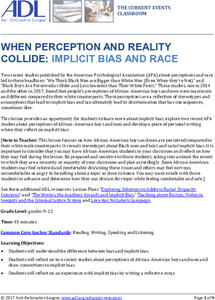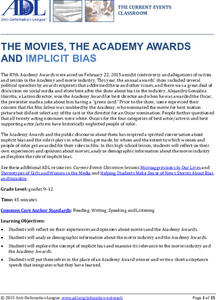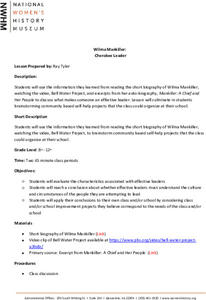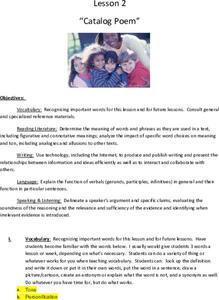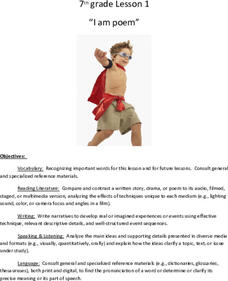C3 Teachers
Emancipation: Does It Matter Who Freed the Slaves?
Scholars generally agree on the emancipation of enslaved people in the United States. This inquiry-based lesson asks high schoolers to consider more than the claims of who freed the enslaved people but the significance of the issues...
C3 Teachers
African American Voices and Reconstruction: What Does It Take To Secure Equality?
High schoolers research the 13th, 14th, and 15th Amendments, as well as other primary source documents, to determine Reconstruction's impact on the North and South. The 34-page inquiry-based lesson includes a staging question and...
Anti-Defamation League
Major League Baseball and the Negro Leagues: Correcting an Injustice
It's been a long time coming! In 2020, MLB Commissioner Robert D. Manifred, Jr. stated that "the Negro Leagues would be recognized as official major leagues." Middle schoolers investigate the history of the Negro Leagues and use evidence...
Anti-Defamation League
Microaggressions In Our Lives
Defining, identifying, and learning how to counter microaggression is the lesson's focus for high schoolers. Learners examine a definition of the term, write about their own experiences with microaggression, watch short video examples,...
Anti-Defamation League
What is the Soul Cap and Why Was it Rejected for Olympic Use?
In 2021 the FINA, the International Swimming Federation, banned using Soul Caps in the Tokyo Olympics. Middle schoolers investigate why the committee made this decision and the resulting backlash, including charges of discrimination and...
Anti-Defamation League
What are Reparations and Should We Enact Them?
Young social scientists investigate recent legislative proposals for reparations for African Americans. They examine the rationale behind the proposals by viewing videos and reading related articles. To close the lesson plan, scholars...
Anti-Defamation League
When Perception and Reality Collide: Implicit Bias and Race
The big idea in this lesson is that implicit bias often clouds perceptions. High schoolers watch a short video, read research articles, and engage in discussions about implicit bias and how these biases lead to stereotyping. They craft...
Anti-Defamation League
The Movies, the Academy Awards and Implicit Bias
"And the award goes to. . . " High schoolers investigate bias in the movie industry by reading articles, watching a short video, and examining data about the Academy of Motion Picture Arts and Sciences (AMPAS) membership, nominees, and...
Anti-Defamation League
Women’s Inequity in Pay: Could It Be Sexism, Implicit Bias or Both?
Equal pay for equal work? High schoolers research the reasons for the inequity in women's pay. They read articles, examine graphs, engage in discussion, and then craft an essay in which they suggest a way to address the gender wage gap.
Curated OER
Abigail Adams and Thomas Jefferson
In addition to her letters to her husband, family members, and friends, Abigail Adams also wrote to key political figures of the time. In this lesson, scholars examine letters Adams' wrote to and received letters from Thomas Jefferson...
Curated OER
Abigail as Mother (Part II)
Different tones for different audiences. That's the big idea behind the second lesson in a two-part series that reveals Abigail Adams as a mother. Scholars examine letters Abigail Adams wrote to her sons, John Quincy Adams and Charles...
National Woman's History Museum
Wilma Mankiller: Cherokee Leader
Middle and high schoolers consider the characteristics that make for a great leader. For example, they investigate Wilma Mankiller, the first female Principal Chief of the Cherokee Nation. Researchers read a short biography, watch a...
National Woman's History Museum
Dolores Huerta: The Life and Work of a 20th Century Activist
Extra! Extra! High schoolers read about Dolores Huerta, the social activist who helped organize the United Farm Workers. Researchers read primary and secondary sources about Huerta's work and craft a headline, supported by three pieces...
Teach Engineering
Cosmic Rhythm
Young engineers turn poets with a hands-on activity that challenges them to apply the concept of rhythm to crafting a poem.
Academy of American Poets
Incredible Bridges: “Cotton Candy” by Edward Hirsch
Read it, hear it, see it, do it! Young poets experience Edward Hirsch's memory poem, "Cotton Candy," by first closely reading the poem silently, then aloud, watching a video of the poet reading it, and crafting their memory poem of an...
Utah Education Network (UEN)
8th Grade Poetry: Narrative Poem
The first lesson of a five-lesson unit designed for eighth graders has class members reading and watching a video of Edgar Allen Poe's narrative poem, "The Raven." They then craft their narrative poem, illustrate it, and share their work...
Utah Education Network (UEN)
8th Grade Poetry: Sonnet Poem
The third lesson of five in an eighth-grade poetry unit has young scholars comparing Shakespearean sonnets with Petrarchan sonnets. To begin, they examine the different structures of the two forms and their different rhyme schemes. After...
Utah Education Network (UEN)
8th Grade Poetry: A to Z Poem
A two-part lesson asks eighth graders first to draw connections between the myth of Aengus and William Butler Yeats' poem "The Song of Wandering Aengus." In the second part of the lesson, writers craft an "A to Z Poem."
Utah Education Network (UEN)
8th Grade Poetry: Catalog Poem
After conducting a close reading of Billy Collin's poem "Forgetfulness" and responding to questions on a worksheet, young poets craft catalog poems and share their work with a partner. The lesson ends with the partner using the provided...
Utah Education Network (UEN)
8th Grade Poetry: Assess
Eighth graders craft a Petrarchan sonnet and respond to a performance assessment to demonstrate what they have learned in this five-lesson poetry unit.
Utah Education Network (UEN)
7th Grade Poetry: Sonnet Poem
Two sonnets provide seventh graders with examples of Shakespearean sonnets. After discussing the story of the poems and analyzing their rhyme scheme and rhythm, young poets craft a Shakespearian sonnet and share their work with two...
Utah Education Network (UEN)
7th Grade Poetry: Assess
To assess what scholars have learned throughout a five-lesson poetry unit, seventh graders first craft a Shakespearean sonnet based on a poem they have studied. In part two of the assessment, scholars complete a four-texts performance task.
Utah Education Network (UEN)
7th Grade Poetry: I Am Poem
A study of Alfred Noyes's poem "The Highwayman" opens a lesson plan about narrative poetry. Scholars read the poem and compare it to the animated video version using a worksheet. Learners look at models and use a template to craft an "I...
Texas Education Agency (TEA)
Drawing Conclusions Based on the Sufficiency and Strength of Research (English III Reading)
High school juniors learn how to construct a strong argument by crafting a claim and using neutral language backed by evidence from reliable sources. To do so, they learn to evaluate sources and evidence to support claims. They then...
Other popular searches
- Arts and Crafts
- Arts and Crafts Movement
- Christmas Arts and Crafts
- Arts and Crafts Winter
- Christmas Crafts
- Collage & Crafts
- Preschool Arts and Crafts
- Flowers +Craft
- Collage Crafts
- Writers Craft
- Seasonal Arts and Crafts
- Arts and Crafts Activities








